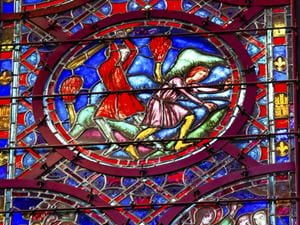
Cain and Abel were Adam and Eve’s first two sons. Their story is a famous biblical story commonly linked with obedience, brothers, and disobedience of God’s instructions and the effects of murder. Still, their significance in a more insightful understanding of Cain and Abel isn’t widely known.
The biblical story of Cain and Abel.
Genesis 4:1-16 tells us that Adam and Eve made love and conceived their first son, Cain. She later gave birth to their second son, Abel. Cain worked the soil while Abel was a shepherd. Over time, Cain brought fruits from his crop as an offering to God. Abel also brought fat portions for the firstborns of his flock. God looked with favor on Abel’s offering, but He didn’t look with favor on Cain’s offering, which made him angry.
Then, God asked Cain why he was angry, and his face was downcast, saying if you do what’s right, you’ll be accepted. However, if you don’t do what’s right, sin lurks at your door, desiring you, but you have to fight it. Afterward, Cain invited Abel out to the field. While there, Cain attacked Abel and killed him. Then, God asked Cain, “Where is your brother Abel?” Cain replied, “I don’t know. Am I my brother’s keeper?”
God asked him what he had done, saying Abel’s blood cries out for Him from the ground. Then, he told Cain that he was under a curse. When he worked the land, it’ll no longer yield crops for him, and he’ll be a restless wanderer on earth. Cain replied, saying he couldn’t bear his punishment. God was driving him away from the land, and he would be hidden from God’s presence. He agreed that he would be a restless wanderer of the earth but added that whoever found him would kill him. However, God told him that anyone who killed him would suffer, putting a mark on Cain so no one who found him could kill him. So Cain left God’s presence, living in God, which sits east of Eden.
Cain settled in Nod, married a sister, cousin, or niece, and had descendants listed in the Bible to the sixth generation. He built a city; his descendants included nomadic herders, smiths, and musicians. Cain’s descendants, recorded in Genesis 5, grew more evil. Lamech was a murderer and polygamist, boasting of his sin. All of Cain’s seeds were likely wiped out in the flood. Genesis 5 details the godly line of Seth, Cain’s younger brother. Seth’s descendants included Methuselah, Noah, and Enoch.
Cain’s tragic story shows the damaging effects of jealousy and anger. The disobedience and willfulness of Cain are indicated in the Bible as a cautionary tale to those who might follow in his footsteps. In 1 John 3:12, we’re warned of a lack of brotherly love, saying don’t be like Cain, who belonged to the evil one and killed his brother. It goes on to ask why Cain murdered him, saying it was because Cain’s actions were evil and Abel’s actions were righteous. People who welcome evil into their hearts naturally hate the righteous.
Hebrews 11:4 explains why God rejected Cain’s offering, saying by faith, Abel brought a better offering than Cain did. Abel had faith, and we can infer that Cain didn’t. He didn’t receive God’s approval because his heart wasn’t right with God. It’s impossible to please God without faith. Jude spoke against ungodly men “who pervert the grace of our God into a license for immorality and deny Jesus Christ,” explicitly detailed in Jude 1:4. These hypocrites in the church face judgment; like Cain, they’ve rejected God’s will and proudly continue to ignore God’s warnings, and will ultimately be judged in the end.
How old was Cain when he killed Abel?
The Bible doesn’t explicitly state how old Cain was when he killed Abel. However, we can learn so much more from their story. First, we understand the role of each brother’s industry, herding and farming. Cain and Abel were in two different job fields. While Able was a herder, Abel was a farmer. In their story, we know that they both offered sacrifices to God, but God liked Abel’s sacrifice more. God was happy with the lamb Abel offered but was displeased by Cain’s crop offering. This made Cain jealous, causing him to kill his brother, bringing him into years of unfruitfulness and wandering.
In the Bible, Cain’s farming industry was a metaphor for Egypt and Mesopotamia, both enemies during this time. Being a farmer meant settling in one land and making it fruitful through crop production. It also meant that the land might become a village with homes near its crops, meaning there would be farming practices that could poison the land. Farming is a challenging industry, so taking time to reflect on life’s meaning and prayer is difficult to manage.
On the other hand, Abel’s herding industry meant he could be anywhere, not in a specific land. Herding made Abel self-sufficient and nomadic. Abel lived a simple life and had time to reflect on life’s meaning, tell stories, and pray, which he chose to do. Both industries were promising and were used to sustain life. However, God didn’t favor Cain’s sacrifice because of his way of life and choices; Cain didn’t make time to communicate with God and praise Him.
It’s essential to note that it wasn’t their lifestyles but the choice each brother made in their heart. Abel could’ve ignored God even though he had enough time, whereas Cain could’ve decided to spend more time with God even though his time was limited. Still, the heart choice these men made in their lives truly mattered to God.
Cain and Abel’s story is one of the most well-known biblical tales. Though we don’t know how old Cain was when he killed Abel, we see that he killed his brother out of jealousy and anger. Cain never showed remorse for killing his brother, but he knew a target would be on his back due to his decision. However, even knowing what he had done, God chose to protect Cain from those threatening his life, making him an eternal wanderer.

